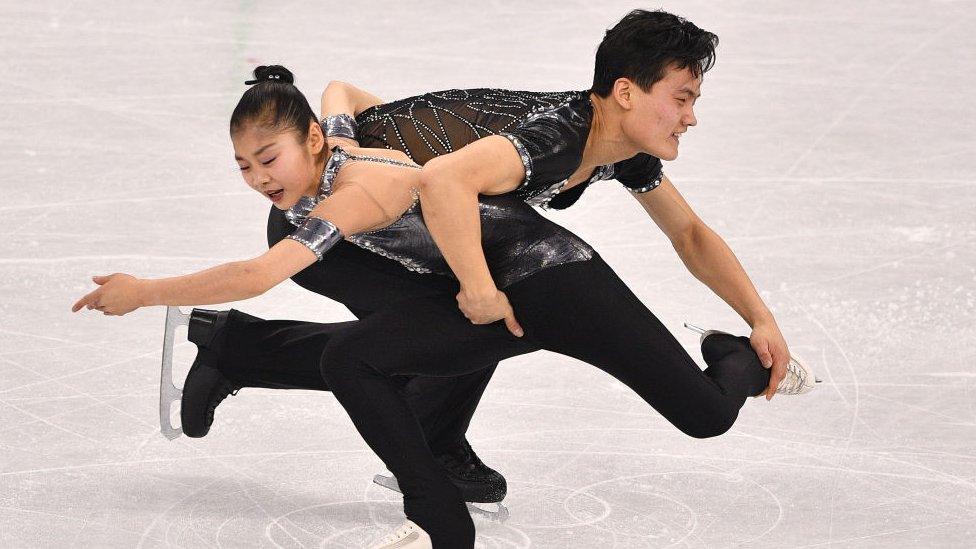How Canada's Tessa Virtue and Scott Moir beat France
- Published
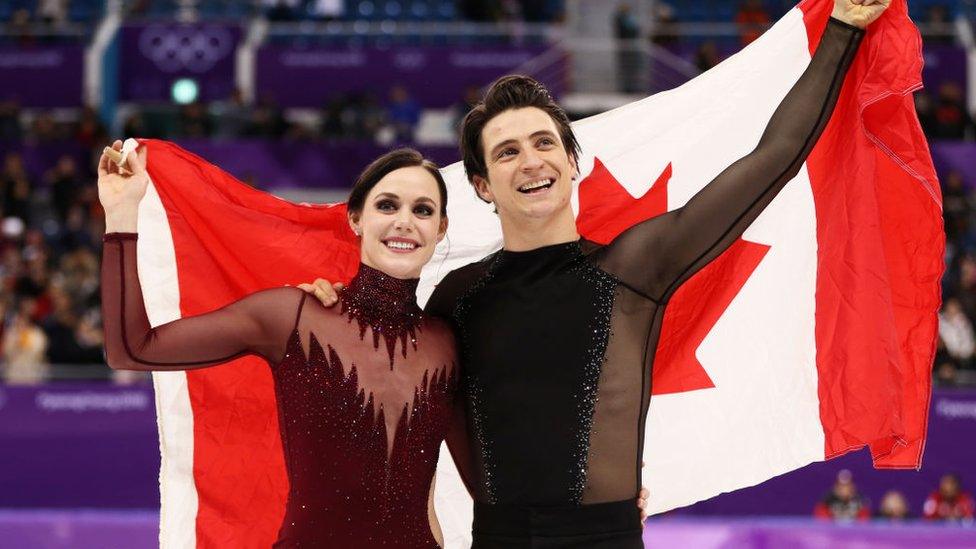
Tessa Virtue and Scott Moir are the most decorated Olympic figure skaters in history
Four years ago, Canadian ice dancers Tessa Virtue and Scott Moir thought they might never compete in the Olympics again. But after teaming up with new coaches in Montreal, the pair took home the gold in Pyeongchang after beating their French rivals Gabriella Papadakis and Guillaume Cizeron by just .79 points.
If you asked Tessa Virtue if she would be skating in the 2018 Winter Olympics four years ago, she probably would have shrugged.
She had just won a silver medal in ice dancing in Sochi with her long-time partner, Moir, placing behind Americans Meryl Davis and Charlie White. It was perhaps a letdown after the elation of winning gold in the 2010 Olympics in Vancouver.
"No, I think in Sochi we truly believed that was it - and we were comfortable with that. We were happy with our performances; we were content with our experience," she told Maclean's Magazine in an interview this year, external.
Moir and Virtue decided to take a break.
Virtue, 28, tried to finish her psychology degree at Western University in her hometown of London, Ontario and designed a jewellery line.
Moir, 30, spent time with his family, including his brother, former ice dancer Danny Moir.
But in late 2016, the duo announced that they would make a comeback with intention of competing in Pyeongchang in 2018.
The announcement shocked the skating community, with 2002 Olympic pairs skating champion David Pelletier telling the CBC he would "never, ever, ever" have made that decision.
After dropping from gold to silver between 2010 and 2014, why risk defeat in 2018?
What their colleagues and fans did not know at the time was that Virtue and Moir would go on not only to compete, but absolutely dominate the sport over the next two years.
They were undefeated in the 2016-17 season, winning Worlds in March with a record-breaking combined score of 198.62 points.
But Papadakis and Cizeron gave them a run for their money, beating them in the free dance portion of the competition by 3.04 points, which set the world record with 116.19 points.
In December, just months before both teams were set to head to Pyeongchang, Papadakis and Cizeron took first place at the Grand Prix of Figure Skating Final, scoring a world-record of 202.16 points - just 2.3 points higher than Moir and Virtue.
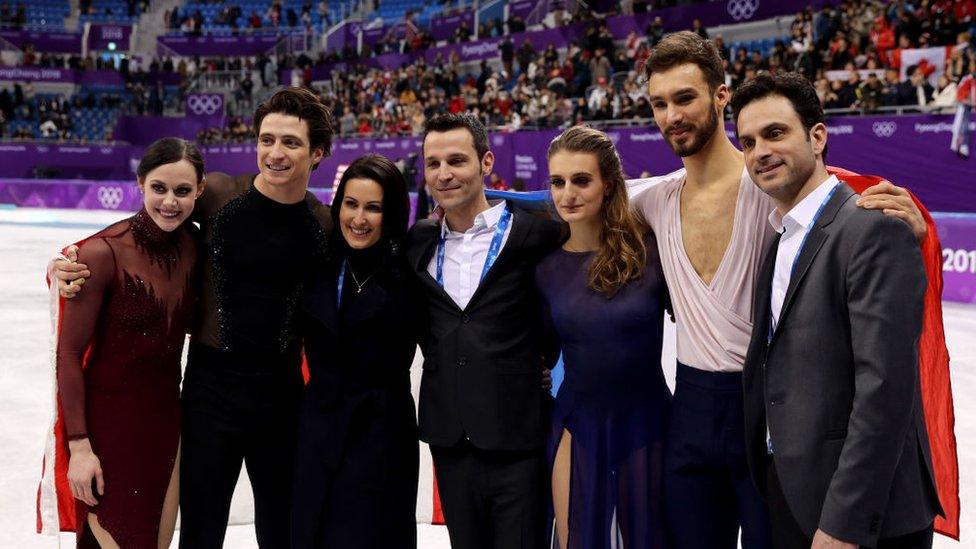
Tessa Virtue and Scott Moir (left) alongside their rivals Gabriella Papadakis and Guillaume Cizeron (second and third from right) and their coaches
Their close defeat was no surprise - Moir and Virtue trained alongside Papadakis and Cizeron in Montreal under the tutelage of legendary ice dancing coaches - husband-and-wife Marie-France Dubreuil and Patrice Lauzon as well as Romain Haguenauer.
"These kids, we train them five hours a day and we see them grow. We know what their goals are and we just support that. The competition is about them, it's not about us. So, in whatever order is the same to us," Dubreuil said after the results were announced, external.
At their elite rink in Montreal, the Canadian and French rivals would skate alongside one another for five hours a day, giving them plenty of time to learn each other's strengths and weaknesses.
Papadakis and Cizeron have an elegant, lyrical style while Moir and Virtue are known for their sensuality and energy on the ice.
"They're a type of team that has beautiful long lines, create a pretty picture. Tessa and I, what we'd like to be - it's so hard to evaluate ourselves - when we're training, focusing on things, it's about a man and a woman, what we create between each other, working off each other," Moir said, external.
"The way Tessa moves her upper body, which is kind of what ice dancing is all about for us. That's the biggest difference.
"We don't say that begrudgingly, because we're fans. We watch them, we love their style. Just...so different."
The differences between the two couples are easily summarised by their music choices for the free skate event at the Winter Olympics.
The French danced to Beethoven's Moonlight Sonata, while Moir and Virtue danced to El Tango De Roxanne from the movie-musical Moulin Rouge.
The stakes going into Pyeongchang were high for both pairs. For first-time Olympians Papadakis and Cizeron, an Olympic gold against Moir and Virtue would earn them more credibility and France its second gold in Olympic history.
For veterans Moir and Virtue, a gold would vindicate their comeback and help them cement their legacy as one of the greatest teams in the history of the sport.
The duo got a head start on that legacy on 11 February, when they helped earn Canada a gold in the team figure skating event with their first-place free skate.
Papadakis and Cizeron did not compete in the team event, and France finished last.
Then, in Monday's short skate programme, Papadakis experienced her "worst nightmare" when her costume became unclasped, exposing her breast. She still gave the performance of her lifetime, and the pair took second place with 81.93 points.
Moir and Virtue nabbed first with a world-record score of 83.67.
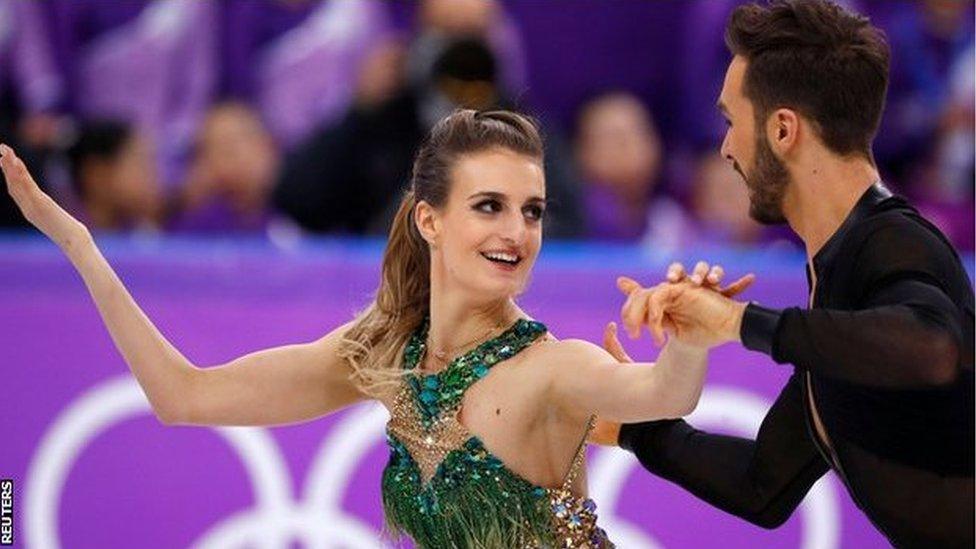
Gabriella Papadakis and partner Guillaume Cizeron took silver in ice dancing after a costume slip-up in their short programme
Ice dancing is a difficult sport to judge - unlike figure skating, which is scored based on how many difficult jumps and lifts in a routine, ice dancing is scored more on the overall performance.
Slight differences in technique and precision can make huge differences in scores. To pull off that score while exposed is a testament to Papadakis' poise, professionalism and undeniable skill.
"My worst nightmare at the Olympics. I told myself 'you have to keep going'," she said. "That's what we did, and we have to be proud of ourselves, delivering a great performance with that happening."
When it came time for the free skate - the premier event in ice dancing - there could be no costume slip-ups.
Papadakis and Cizeron's routine was superb, earning them a world-record of 123.35 points for the event over Virtue and Moir's 122.40. But in the end, the margin was not big enough to eclipse the Canadians world-record breaking combined score.
"If we had more points yesterday, we would probably be in first place," Cizeron says, external. "But that's sports."
Moir and Virtue's gold medal have made them the most decorated figure skaters in Olympic history - an excellent career high note to leave on. Virtue says that "after the dust settles" the pair are likely to announce their retirement.
That leaves a spot open for Papadakis and Cizeron to come in as the next ice dancing powerhouse - away from the long shadow of Moir and Virtue.
"I would say that how we want to be remembered is by inspiring the next generation, and that goes for Canadians and anyone in the world. Hopefully ice dance has come to a new level," says Moir.
- Attribution
- Published20 February 2018
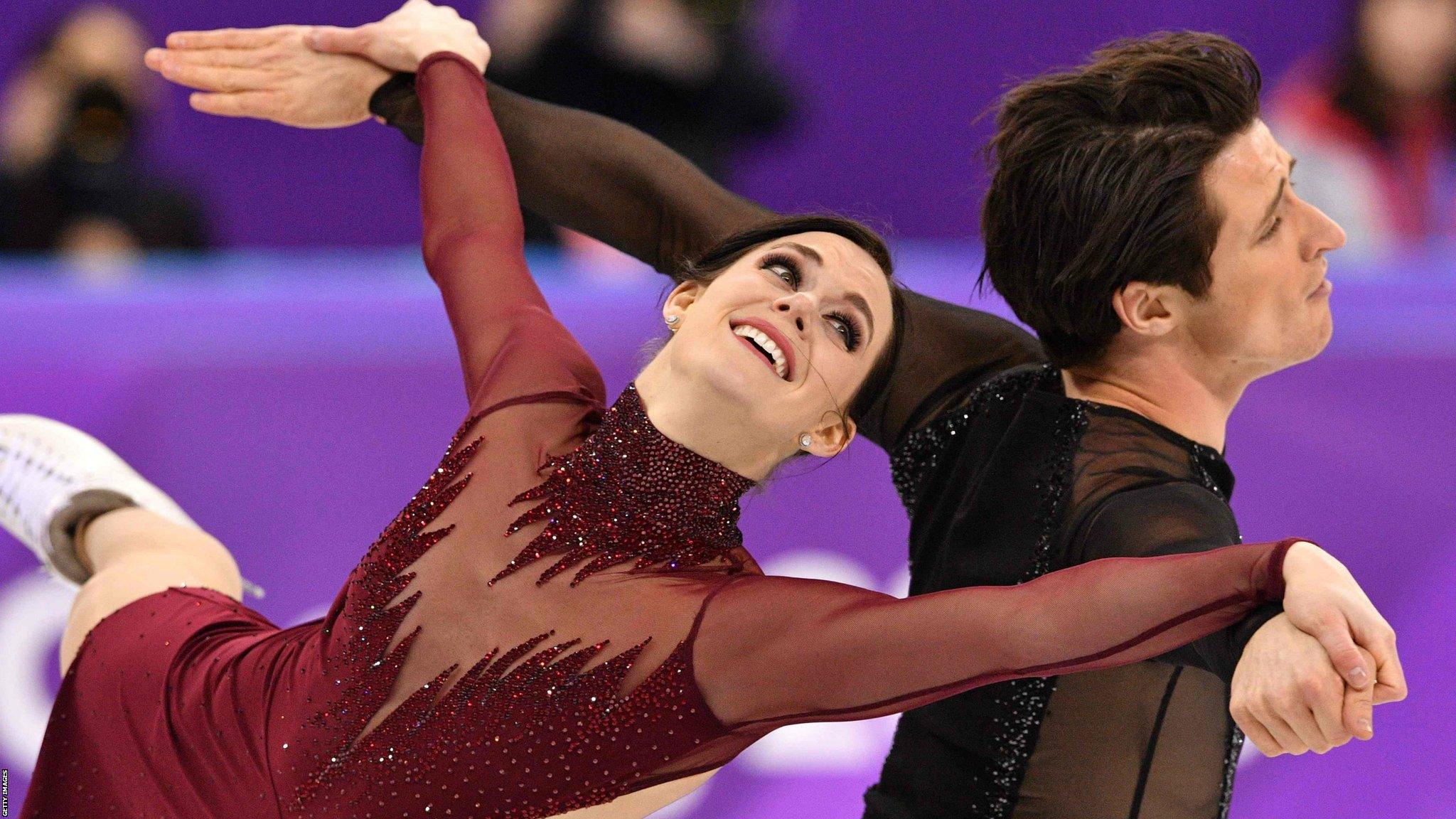
- Attribution
- Published19 February 2018
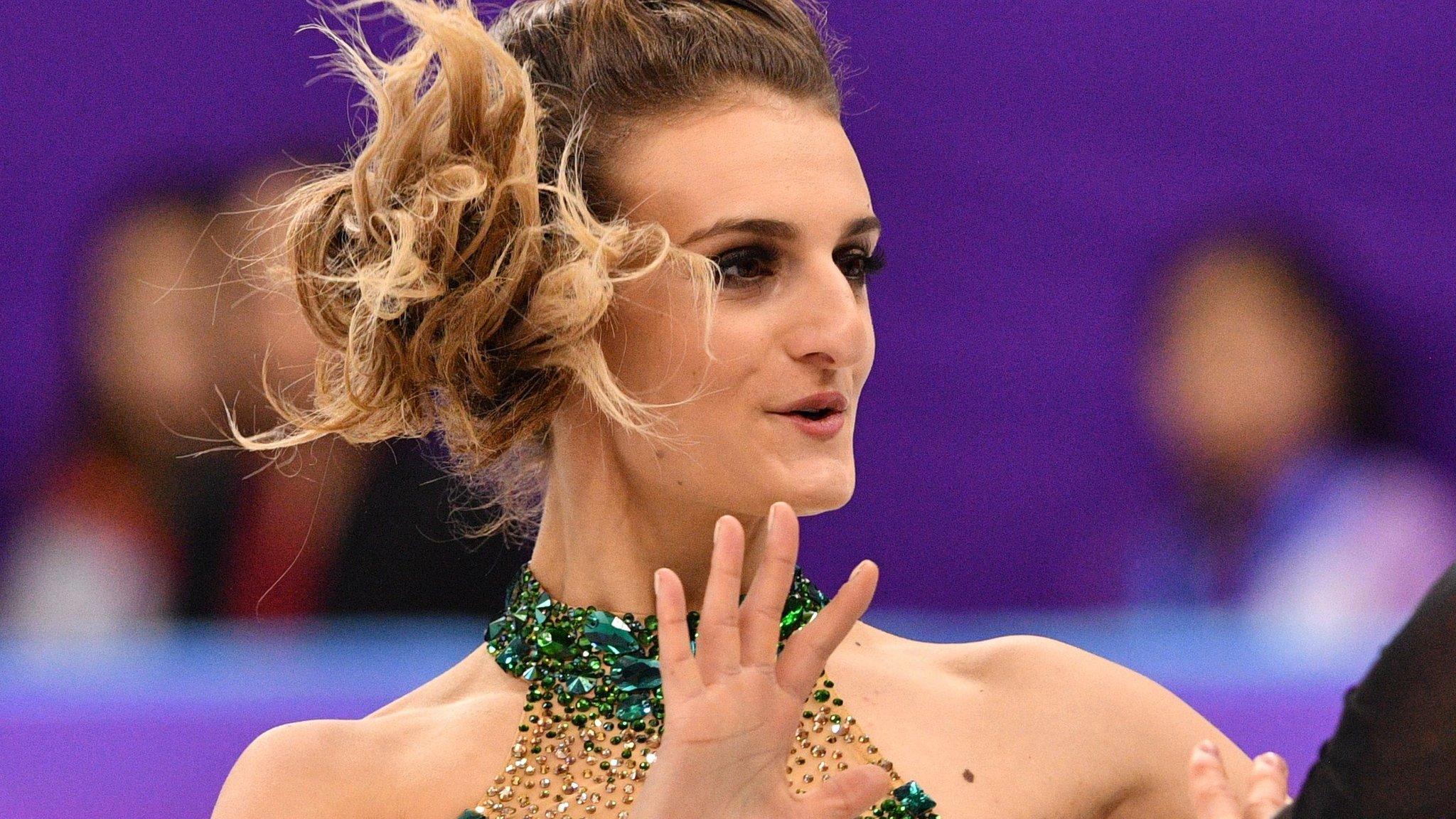
- Published14 February 2018
